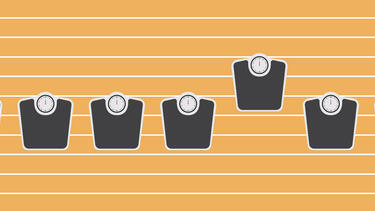For Motivation, Dieters Look to the ‘Biggest Loser’
When you’re trying to lose weight, boost your grades, or improve your golf game, is comparing yourself to a top performer discouraging or motivating? A study co-authored by Yale SOM’s Kosuke Uetake found that participants in a national diet program lost more weight when someone in their group was a standout.

What inspires you to race to the gym or lay off the chips? For many, the people in our social circles motivate us to make healthy lifestyle choices—or unhealthy ones.
Humans are the social animal, and even what seems like an individual effort—such as trying to lose weight—can be influenced by the people around us. But Yale SOM professor Kosuke Uetake and his colleague Nathan Yang of McGill University wanted to know whether seeing someone else succeed exceptionally would prove inspiring to participants in a group-based weight loss program, or whether being able to measure themselves against average performers might be more motivating.
In a recent study, Uetake and Yang found that in one commercial weight loss program, some top-performing individuals—the “biggest losers”—have a surprisingly large impact on how much the people around them lose.
It’s not an intuitive or obvious finding, Uetake says. “If I see someone performing extremely well, I might think, ‘I can’t do that,’ so a top performer might have a discouraging impact,” he says. “Instead, we find it’s motivational.”
Read the study: “Inspiration from the ‘Biggest Loser’: Social Interactions in a Weight Loss Program”
The researchers gathered data from a large, national weight loss program to figure out how different people in a group can influence their peers. The program relied on a calorie budgeting system, where people kept track of the number of calories they consumed, and a series of weekly meetings where participants met with peers and group mentors to monitor and share their progress. Each meeting began with a weigh-in. Then a mentor led a short discussion of healthy lifestyles and meeting attendees took turns sharing their progress, including what helped (or didn’t help) them to lose weight.
Uetake and Yang collected a range of data about meetings: how far people traveled to attend a session, how many meetings they attended, how weather affected attendance, and more. The average participant, they found, was a woman in her 50s who wanted to lose approximately 14 pounds.
When they analyzed the data to see what factors influenced individual weight loss most, they found a clear trend: an individual lost less weight when the average weight loss in the group was greater, and lost more when the biggest loser in their group lost more.
An increase of 1 kilogram (2.2 pounds) in an average peer’s weight loss was correlated with a slight reduction in an individual’s weight loss—in other words, they did worse. But if the top performer’s weight loss increased by 1 kilogram, an individual in the group was more likely to have shed more weight than usual at the subsequent weigh-in—they did better. Because the attendees at meetings can vary from one week to the next, the biggest loser isn’t always the same person.
“So if at one session I meet someone who has lost two pounds in the last week, and at another meeting the top performer lost five pounds since their last check-in, I’m likely to lose more weight after the second encounter compared to the first,” Uetake explains.
The results can help weight loss programs improve how they promote their participants’ successes to groups. They’re also relevant to classroom settings, where students are often provided with a median grade on their transcripts alongside their own grades. The data suggest that sharing the top score in the class instead might boost overall grades.
“We weren’t quite expecting to find the negative effect of the average performer,” Yang says. Perhaps, he theorizes, when average peers perform well, participants may become discouraged and feel they’re sure to fall short. “It’s a bit like providing a benchmark that half the group won’t be able to reach anyway.”
Many products, including games and fitness trackers, play off social interactions to engage users. Companies that market such products should consider whether to share averages or top rankings to motivate their users, Uetake says. The results apply to “any socially integrated apps where you sign in using a social media account and you can see what your friends are doing,” Yang adds. “Whether it’s playing a game, saving money or comparing your electricity or energy usage—this applies anywhere that we interact with someone else and we can observe how well they perform.”